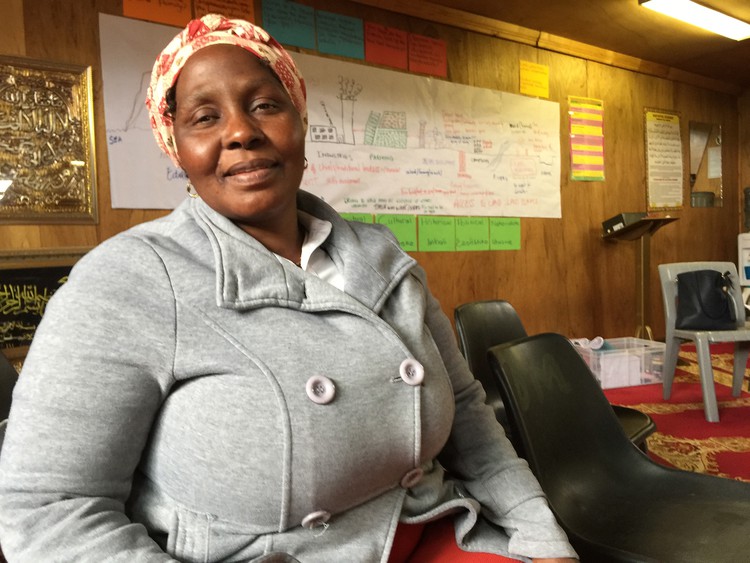
Nowongile Swebe moved to Cape Town from the Eastern Cape in 1989. Photo: Peter Luhanga
5 June 2018
Nowongile Swebe left her rural village in the Eastern Cape in 1989 to settle in Cape Town. She was hoping for better living conditions and more economic opportunities.
She settled at what was then the Frankdale informal settlement on the periphery of the Visserhok landfill site, about 20km north of the city centre.
In June 2015 the City of Cape Town needed to expand the landfill site. The residents of Frankdale, including Swebe, were moved to Wolwerivier, about 5km further north and further away from the city centre. Wolwerivier falls under ward 104 which includes Dunoon.
Here, Swebe lives with her five children and seven grandchildren in a one-room house, she says. She has used a cupboard to divide the room.
Back home, she says, her father owns a big piece of rural land, which he shares with his three wives and children.
Even though she was looking for improved living conditions, her dreams of achieving this faded over the years as she still lives in an overcrowded home.
Swebe and other people shared their stories with several community leaders from Dunoon, Doornbach informal settlement and Wolwerivier on Saturday. They had gathered at the Dunoon Nasqshbandi Muhammadi Mosque where the Claremont Main Road Mosque was holding workshop on land expropriation without compensation, in conjunction with the Institute for Healing of Memories. The workshop follows a spate of land occupations in the area.
“This discussion [on expropriation without compensation ] is eye-opening. We live like rats. That is why we toyi-toyi. Hence we need to get back the land. … Why is it that people who have land respect dogs more than humans? We need our land back,” said Swebe.
At Wolwerivier, she said there was no school, police station or clinic. To bury dead family members, residents go to the cemetery in Atlantis.
“My father is a farmer and we don’t buy food back in the Eastern Cape. And if we get land, even if it’s agricultural land we will be able to utilise it just the same as the current owners,” she said.
Asked why she didn’t stay with her father, Swebe replied that she had come to Cape Town to find better living conditions.
However, one Dunoon resident had different views. Eliot Nkohla, who lives in Dunoon’s section 31, said if land was repossessed without compensation it would create economic chaos.
“We are claiming that we can go back to the olden days, [before] white people took our land from our forefathers without paying for it. If we take land from white farmers and not pay for it, it will be a big problem. This country will be bankrupt. Expropriating land without compensation will be disastrous,” said Nkohla.
Another Dunoon resident, Busi Ganjana, said that the government should develop, and invest in, provinces experiencing a mass exodus of people. These provinces lacked economic opportunitiesw but had plenty of land.
Babalwa Mpambani, a representative of the Institute for Healing of Memories, said that in Khayelitsha there was no vacant land available and when people died, they were buried in already used graves. Bodies were piled on top of each other in the grave.
“For us it’s indecent to bury our deceased on top of another person who is not related. Back in the Eastern Cape we don’t buy a grave, but here in the Western Cape we buy a grave. But even if you buy the grave, your deceased family member gets buried on top of another deceased person, not related,” said Mpambani.
The workshop, said Rashied Omar, imam at the Claremont Main Road Mosque, was an opportunity to hear what people on the ground were saying about the critical issue facing “our nation and people on land expropriation and redistribution”.
“Often it’s the elites that give their views around this issue. … The marginalised rarely get an opportunity to be heard about what they think on important issues,” said Omar.
He said the workshop was hosted as part of the annual distribution of food hampers to needy residents.
“Instead of just doing charity we also want to do empowerment and show solidarity with marginalised communities like Dunoon. We will compile the workshop group discussions and submit to Parliament what people in Dunoon think about land expropriation without compensation,” he said.
Fatima Swartz of the Institute for Healing of Memories said the wounds and pain experienced by people during colonialism and apartheid were connected to land. This was why there was so much rage, she said.
“Part of addressing the past injustices is for people to understand the damage that was done to them, [such as being] forcibly removed from their own land,” she said.
“People do not want to go and grab land … People just want decent homes. They are not asking for palaces.”